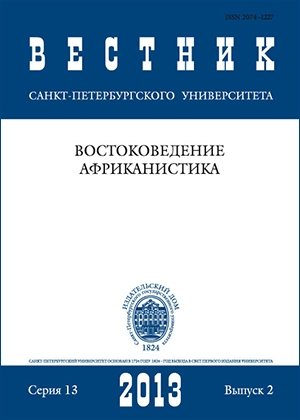The role of the policy of the Chinese Communist Party (CCP) in the character portrayal in Chinese literature of 1949 — early 1960s
Abstract
The present article examines the major milestones of the Chinese government policy in character portrayal in literary works from 1949 to early 1960s. The author analyzes the main documents illustrating the official doctrines of the CCP that were in force within several party lines successively being carried out during that period. Some aspects of discussions between writers, critics and political leaders concerning the party rules of character portrayal published in official literary journals were also studied. The period of party governance over Chinese literature can be described as a zigzag on a timescale, which starting point is set earlier — from Yan’an Talks on Literature and Art by Mao Zedong in 1942 seen as a solid basis for the literary policy of CCP in the following years. The literary period can be characterized by several ups and downs when the party leadership alternately enhanced or reduced its control over literature. Literary thaws, announced by CCP (founding of China Federation of Literary and Art Circles and Chinese Writers Association, Hundred Flowers Campaign, “adjustment” policy) gave writers an opportunity to be relatively independent in creating literary characters and express their frank opinions on character portrayal. Every such indulgence was inevitably followed by a stern response from the authorities (Campaign against Hu Feng’s counter-revolutionary clique, Great Leap Forward and struggle with “poisonous weeds” in literature, dismissing of polemic on the “men in the middle”) who suppressed the attempts of writers to go beyond such oppositions as “positive-negative”, “good-bad”, “friend-enemy”, “socialist-capitalist”, “progressive-backward”. During such political fluctuations the literary hero swung from the range of emotions, feelings, actions to two-dimensional features limited by its social role. Nevertheless, the Mao’s “Yan’an theses” about picturing life and accordingly the literary protagonists “loftier, brighter… and more perfect” than real situations and people remained paramount at any time.
Keywords:
Chinese literature, literary policy, literary character, Mao Zedong Thought, CCP
Downloads
References
Downloads
Published
How to Cite
Issue
Section
License
Articles of "Vestnik of Saint Petersburg University. Asian and African Studies" are open access distributed under the terms of the License Agreement with Saint Petersburg State University, which permits to the authors unrestricted distribution and self-archiving free of charge.





